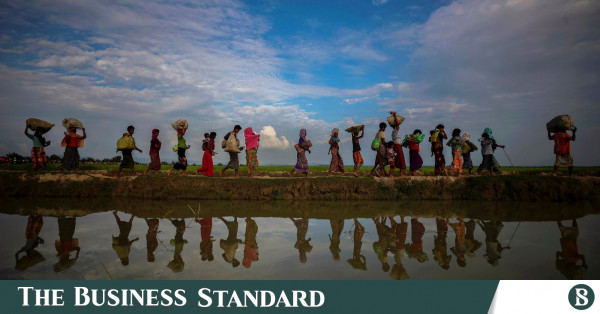Bangladesh can recognise Rohingyas as refugees, following India’s 1971 example: Civil Society


“If Rohingyas were given travel documents, they would not have risked crossing the sea illegally to other countries. They could have also legally taken their families with them,” said a speaker
Rohingya refugees walk towards Cox’s Bazar fleeing from military oppression in Myanmar. File Photo: Reuters
“>
Rohingya refugees walk towards Cox’s Bazar fleeing from military oppression in Myanmar. File Photo: Reuters
The civil society has advocated for Bangladesh to recognise Rohingya as refugees, citing India’s 1971 example of recognising Bangladeshi refugees, despite not having ratified the Geneva Convention.
During a webinar organised by Coast Foundation and the Cox’s Bazar CSO-NGO Forum (CCNF) on World Refugee Day (20 June), the speakers emphasised this approach.
Speakers at a webinar organised by Coast Foundation and the Cox’s Bazar CSO-NGO Forum (CCNF) on World Refugee Day (20 June).
“>
Speakers at a webinar organised by Coast Foundation and the Cox’s Bazar CSO-NGO Forum (CCNF) on World Refugee Day (20 June).
National and international refugee experts spoke at the online seminar chaired by Shireen Haque of Naripokkho and moderated by Rezaul Karim Chowdhury of Coast Foundation.
Gawhar Naeem Wahra of the Disaster Forum drew parallels with the 1971 Bangladeshi refugees in India, urging Bangladesh to officially recognise Rohingyas.
He said, “About ten million Bangladeshi refugees took shelter in India in 1971. India then recognized them as refugees despite not having ratified the Geneva Convention. Bangladesh can also follow that example and recognize Rohingya as refugees.”
Wahra further highlighted the benefits for Bangladesh, and said, “Expatriate refugees currently send money to other Rohingyas who stayed in Bangladesh through informal channels like hundi. If they were recognised, they could send money through banks in a legal manner. This would increase Bangladesh’s foreign reserves.”
Keynote speaker Barkat Ullah Maruf of COAST Foundation addressed Rohingya education concerns, noting, “Rohingyas have little interest in education because there is no internationally recognized certificate.”
He added, “If Rohingyas were given travel documents, they would not have risked crossing the sea illegally to other countries. They could have also legally taken their families with them.”
Hafsar Tamizuddin, secretary general of the Asia Pacific Refugee Rights Network (APRRN), who was born as a Rohingya and now lives in New Zealand, said, “The Rohingya community is still being tortured in Maungdaw and Buthidaung in Myanmar. The international community is not very aware of it.”
She said, “We want transparency in the discussion about Rohingyas with other countries.”
Speakers asserted, repatriation is the only viable solution to the Rohingya crisis, urging international agencies to facilitate meaningful initiatives.




